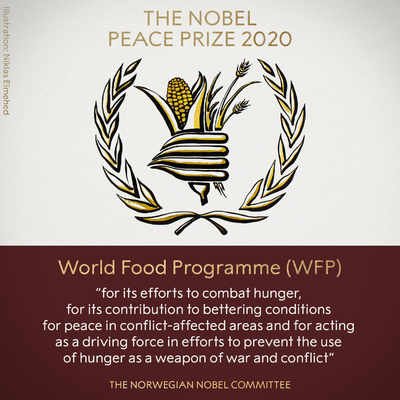The Nobel Prize for Peace for 2020 has been awarded to the United Nations World Food Programme (WFP) “for its efforts to combat hunger, for its contribution to bettering conditions for peace in conflict-affected areas and for acting as a driving force in efforts to prevent the use of hunger as a weapon of war and conflict.”
Established in 1961 and headquartered in Rome in Italy, the World Food Programme is the world’s largest humanitarian organisation addressing hunger, working with communities to build nutrition, and promoting food security. Last year, it provided aid and assistance to nearly 100 million people in 88 countries across the world who are victims of acute food insecurity and hunger.
BREAKING NEWS:
The Norwegian Nobel Committee has decided to award the 2020 Nobel Peace Prize to the World Food Programme (WFP).#NobelPrize #NobelPeacePrize pic.twitter.com/fjnKfXjE3E— The Nobel Prize (@NobelPrize) October 9, 2020
The World Food Programme is governed by an Executive Board which consist of 36 member states. It is headed by an Executive Director whose term lasts for 5 years; American David Beasley has been holding the post since 2017.
For funding its projects, the WFP relies on voluntary contributions. While primarily, these donors are governments, the private sector and individuals also contribute towards its initiatives.
“I think this is the first time in my life I’ve been without words. I was just so shocked and surprised,” Beasley, the Executive Director of WFP said after his organization won the award.
“To receive this award is a recognition to the men and women at the World Food Programme who put their lives on the line every day for the struggling, suffering people around the world. So I hope this is a signal and a message that the World Food Programme is a role model and that we all have got to do more.”
The WFP is the 101st recipient of this prestigious honour.
Announcing the decision, Chairwoman Berit Reiss-Andersen said that with this year’s award the Norwegian Nobel Committee wanted to “turn the eyes of the world to the millions of people who suffer from or face the threat of hunger”.
“The World Food Programme plays a key role in multilateral co-operation in making food security an instrument of peace,” she told a news conference in Oslo.
In the recent past, the organization has worked extensively in hunger hotspots such as Yemen, South Sudan, and the Democratic Republic of Congo.
0